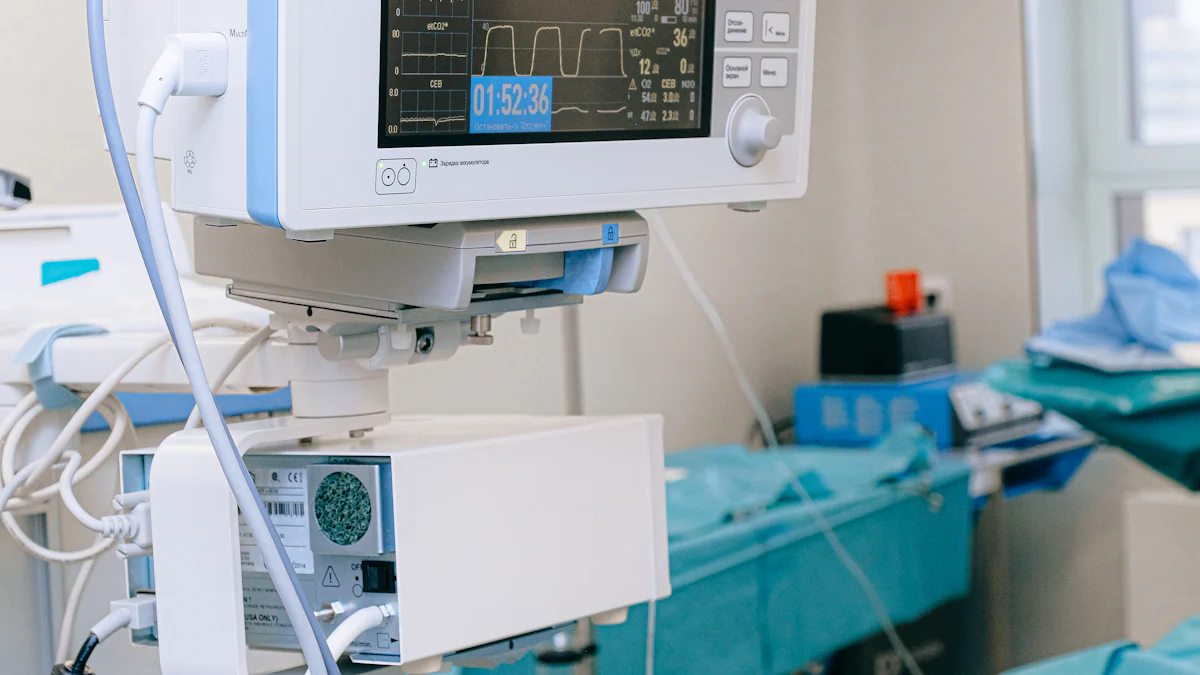Discover 9 AI Tools Revolutionizing Medical Diagnosis

Artificial Intelligence (AI) Medical Diagnosis is reshaping the landscape of medical diagnosis. By leveraging vast amounts of patient data and advanced machine learning, AI enhances diagnostic accuracy and efficiency. AI tools can reduce treatment costs by up to 50% and improve health outcomes by 40%. These tools analyze genetic markers for personalized treatment plans and detect early disease signs in medical imaging. AI's image-based algorithms boast an impressive 95% accuracy rate, surpassing non-specialist doctors. As AI continues to evolve, its role in revolutionizing healthcare through AI Medical Diagnosis becomes increasingly indispensable.
The Role of AI in Healthcare

Artificial Intelligence (AI) plays a pivotal role in transforming healthcare, particularly in the realm of medical diagnosis. By harnessing the power of AI, healthcare providers can achieve unprecedented levels of accuracy and efficiency in diagnosing diseases.
Enhancing Diagnostic Accuracy
AI Medical Diagnosis significantly enhances diagnostic accuracy by analyzing vast amounts of patient data swiftly and precisely. AI algorithms excel in processing complex datasets, which include medical images, genetic information, and clinical records. These algorithms can identify patterns and anomalies that may elude human eyes. For instance, AI systems have demonstrated the ability to outperform humans in disease screening and diagnosis, as highlighted in studies from DelveInsight and ReadySetRecover. This capability ensures that healthcare professionals can make more informed decisions, reducing the likelihood of misdiagnosis and improving patient care.
Moreover, AI's ability to process data quickly leads to earlier detection of diseases. Early diagnosis is crucial for effective treatment, especially in conditions like cancer, where timely intervention can significantly impact patient outcomes. AI tools, with their high accuracy rates, provide healthcare providers with valuable insights, enabling them to tailor treatment plans to individual patients' needs.
Improving Patient Outcomes
The integration of AI in healthcare not only enhances diagnostic accuracy but also improves patient outcomes. AI-driven tools can personalize treatment plans by analyzing genetic markers and patient history. This personalized approach ensures that patients receive the most effective therapies, minimizing adverse effects and maximizing treatment efficacy.
Furthermore, AI's predictive capabilities allow healthcare providers to anticipate patient outcomes and adjust treatment strategies accordingly. By predicting potential complications or disease progression, AI empowers clinicians to take proactive measures, ultimately leading to better health outcomes. As noted in MGMA and eWeek publications, AI's role in optimizing hospital operations and streamlining diagnostic processes contributes to a more efficient healthcare system, benefiting both patients and providers.
AI Medical Diagnosis: IBM Watson Health
IBM Watson Health stands as a pioneering force in the realm of AI Medical Diagnosis. This advanced AI platform revolutionizes healthcare by utilizing cutting-edge data analytics and machine learning. It empowers healthcare professionals to make informed decisions, optimize workflows, and deliver high-quality care.
Key Features
Advanced Data Analytics: IBM Watson Health excels in analyzing vast amounts of structured and unstructured medical data. This capability supports clinical decision-making by providing evidence-based insights.
Personalized Treatment Plans: The platform offers solutions in various domains, including oncology and genomics. By analyzing genetic markers and patient history, it enables personalized treatment plans tailored to individual needs.
Natural Language Processing (NLP): IBM Watson Assistant, a component of Watson Health, uses NLP models to understand questions and provide accurate answers. This feature enhances patient interaction and streamlines communication.
Benefits
Enhanced Diagnostic Accuracy: By processing complex datasets, IBM Watson Health improves diagnostic accuracy. It identifies patterns and anomalies that may elude human observation, ensuring precise disease detection.
Improved Patient Outcomes: The platform's ability to personalize treatment plans leads to better patient outcomes. By minimizing adverse effects and maximizing treatment efficacy, it ensures patients receive optimal care.
Optimized Workflows: IBM Watson Health aids in optimizing healthcare workflows. It streamlines processes, allowing healthcare providers to focus on delivering quality care and improving operational efficiency.
Real-World Applications
Oncology: IBM Watson for Oncology assists clinicians in diagnosing and treating cancer patients. By analyzing medical history and genetic profiles, it provides evidence-based treatment options.
Genomics: The platform accelerates medical research by offering solutions in genomics. It aids in the discovery of new treatments and enhances the understanding of genetic diseases.
Healthcare Chatbots: IBM Watson Assistant empowers patients by providing quick answers to simple questions. This feature allows healthcare providers to focus their time where it is most needed.
IBM Watson Health continues to play a crucial role in AI Medical Diagnosis. Its innovative features and real-world applications demonstrate its potential to transform healthcare and improve patient care.
AI Medical Diagnosis: Google DeepMind
Google DeepMind represents a significant advancement in AI Medical Diagnosis, offering transformative solutions that enhance healthcare delivery. This innovative platform leverages AI to predict and diagnose medical conditions with remarkable precision.
Key Features
Predictive Analytics: Google DeepMind's algorithms can predict acute kidney injury up to 48 hours before it occurs. This early warning system allows healthcare professionals to take preventive measures, potentially saving lives.
Deep Learning Capabilities: The platform uses deep learning to analyze extensive medical datasets, including images and clinical records. This capability enables it to identify patterns and anomalies that might be missed by human clinicians.
Genomic Analysis: Researchers have trained DeepMind to identify disease-causing genes by analyzing changes in human DNA. This feature aids in understanding genetic disorders and developing targeted treatments.
Benefits
Enhanced Diagnostic Accuracy: By mimicking human cognition and processing vast amounts of data, DeepMind improves diagnostic accuracy. It reduces the potential for human error and ensures more reliable diagnoses.
Cost-Effective Healthcare: The integration of AI in medical diagnosis expedites the diagnostic process, making healthcare more cost-effective. It streamlines operations and reduces unnecessary tests, benefiting both patients and providers.
Dynamic Learning: DeepMind continually learns from past cases, adapting to new medical knowledge. This dynamic learning process keeps the platform current with evolving healthcare practices, ensuring it remains a valuable diagnostic tool.
Real-World Applications
Medical Imaging: DeepMind excels in analyzing medical images, such as MRIs and CT scans. It highlights regions of interest that may require further investigation, aiding radiologists in detecting conditions like cancer and cardiovascular diseases.
Disease Prediction: The platform's predictive capabilities extend beyond kidney injuries. It assists in anticipating other medical conditions, allowing for timely interventions and improved patient outcomes.
Genetic Research: By identifying potential disease-causing genes, DeepMind supports genetic research and the development of personalized medicine. This application enhances the understanding of complex genetic disorders and informs treatment strategies.
Google DeepMind continues to revolutionize AI Medical Diagnosis with its cutting-edge features and applications. Its ability to predict, diagnose, and learn dynamically positions it as a leader in the field, contributing significantly to the advancement of healthcare.
AI Medical Diagnosis: Aidoc
Aidoc stands out as a leading AI-powered tool in the realm of medical diagnostics, particularly in radiology. It provides critical, real-time insights that significantly enhance the diagnostic capabilities of radiologists. By focusing on real-time anomaly detection, Aidoc ensures swift and accurate patient care, offering an unmatched advantage in medical diagnostics.
Key Features
Real-Time Anomaly Detection: Aidoc excels in identifying acute abnormalities in medical images, such as CT scans and MRIs. This feature allows radiologists to prioritize urgent cases, ensuring that critical conditions receive immediate attention.
Seamless Integration: The platform integrates effortlessly into existing radiology workflows. This seamless integration enhances efficiency and accuracy, allowing healthcare providers to maintain their focus on delivering quality care.
Comprehensive Imaging Analysis: Aidoc's algorithms analyze a variety of imaging modalities to detect conditions like strokes, pulmonary embolisms, and spinal fractures. This comprehensive analysis aids in faster diagnosis and treatment decisions.
Benefits
Enhanced Diagnostic Precision: By providing precise, actionable data quickly, Aidoc assists clinicians in evaluating patient images effectively. This precision reduces the likelihood of diagnostic errors and improves patient outcomes.
Improved Workflow Efficiency: Aidoc streamlines the follow-up process, ensuring no patient falls through the cracks. Its ability to prioritize urgent cases enhances workflow efficiency, allowing radiologists to focus on the most critical cases.
Timely Patient Care: The platform's real-time insights enable healthcare providers to make faster, more informed treatment decisions. This timely intervention can significantly impact patient recovery and overall healthcare outcomes.
Real-World Applications
Stroke Detection: Aidoc's technology plays a crucial role in detecting strokes early, allowing for prompt treatment and improved patient prognosis.
Pulmonary Embolism Identification: By analyzing CT scans, Aidoc helps identify pulmonary embolisms quickly, facilitating immediate medical intervention.
Spinal Fracture Analysis: The platform aids in the detection of spinal fractures, ensuring that these serious conditions are addressed promptly to prevent further complications.
Aidoc continues to revolutionize AI Medical Diagnosis by enhancing radiology practices with its innovative features and applications. Its ability to provide real-time, actionable insights positions it as a vital tool in modern healthcare, contributing to improved diagnostic accuracy and patient care.
AI Medical Diagnosis: PathAI
PathAI emerges as a leader in AI-powered pathology, transforming the diagnostic landscape with its cutting-edge technology. This platform leverages advanced machine learning algorithms to assist pathologists in making accurate and efficient diagnoses. By analyzing pathology slides, PathAI identifies disease markers and patterns with remarkable precision, significantly enhancing the diagnostic process for complex conditions like cancer.
Key Features
Advanced Machine Learning: PathAI employs sophisticated algorithms, including image segmentation and graph neural networks, to analyze large datasets. These tools detect subtle patterns in medical data that might elude human observation.
High Precision Diagnostics: The platform excels in identifying disease markers, providing pathologists with detailed insights that improve diagnostic accuracy. This capability reduces human error and accelerates the time to diagnosis.
Seamless Integration: PathAI integrates smoothly into existing laboratory workflows, ensuring that pathologists can utilize its tools without disrupting their routine processes.
Benefits
Enhanced Diagnostic Accuracy: PathAI's technology surpasses human performance in disease diagnosis by providing precise and timely insights. This accuracy ensures better treatment outcomes and personalized care plans.
Increased Efficiency: By automating routine tasks, PathAI eases the workload for healthcare professionals. This automation allows pathologists to focus on complex cases, improving overall efficiency in the diagnostic process.
Improved Patient Outcomes: The platform's ability to provide accurate diagnoses leads to early disease detection and personalized treatments. These benefits contribute to better patient outcomes and more effective healthcare delivery.
Real-World Applications
Cancer Diagnosis: PathAI plays a crucial role in diagnosing cancer by analyzing pathology slides for disease markers. This application speeds up the diagnostic process and enhances the accuracy of cancer detection.
Clinical Trials: The platform's AIM-MASH AI-based measurement tools have been utilized in numerous clinical trials. These tools assist pathologists in making MASH assessments, ensuring reliable and effective trial outcomes.
Research and Development: PathAI supports medical research by providing insights into disease patterns and therapeutic efficacy. This application aids in the discovery of new treatments and improves the understanding of complex diseases.
PathAI continues to revolutionize AI Medical Diagnosis with its innovative features and applications. Its ability to enhance diagnostic accuracy and efficiency positions it as a vital tool in modern healthcare, contributing significantly to improved patient care and outcomes.
AI Medical Diagnosis: Zebra Medical Vision
Zebra Medical Vision stands at the forefront of AI-driven healthcare, specializing in medical imaging analytics. This innovative platform empowers radiologists by providing advanced tools to diagnose and detect a wide array of conditions. By analyzing imaging data such as X-rays, CT scans, and MRI scans, Zebra Medical Vision enhances diagnostic accuracy and speeds up the interpretation process.
Key Features
Comprehensive Algorithm Suite: Zebra Medical Vision has developed 48 algorithms that address various medical conditions. These algorithms assist radiologists in diagnosing acute conditions, current diseases, and even in preventive medicine based on past scans.
Multi-Modality AI Triage Solution: The platform offers the first multi-modality AI triage solution, which addresses life-threatening conditions like brain bleeds and pneumothorax. This solution integrates seamlessly into hospital workflows, reducing diagnosis time by 80%.
Second Opinion and Training Assistance: Zebra's algorithms provide radiologists with a second opinion, especially in cases where training is minimal or non-existent. This feature ensures that radiologists can make informed decisions quickly.
Benefits
Enhanced Diagnostic Accuracy: By offering a second opinion and assisting in complex cases, Zebra Medical Vision improves diagnostic precision. This accuracy leads to better patient outcomes and more effective treatment plans.
Streamlined Radiology Workflows: The platform's integration into existing workflows enhances efficiency. Radiologists can prioritize urgent cases, ensuring that critical conditions receive immediate attention.
Augmentation of Radiologists' Work: Rather than replacing radiologists, Zebra Medical Vision aims to augment their work. By automating visual aspects of medicine, the platform helps doctors make the right decisions swiftly.
Real-World Applications
Breast Cancer Detection: Zebra Medical Vision's algorithms assist in the early detection of breast cancer, providing radiologists with detailed insights that improve diagnostic accuracy.
Lung Disease Analysis: The platform analyzes imaging data to detect lung diseases, offering real-time insights that aid in timely intervention and treatment.
Liver Abnormality Identification: By examining liver imaging, Zebra Medical Vision helps identify abnormalities, ensuring that these conditions are addressed promptly.
Zebra Medical Vision continues to revolutionize AI Medical Diagnosis with its cutting-edge features and applications. Its commitment to enhancing diagnostic accuracy and efficiency positions it as a vital tool in modern healthcare, contributing significantly to improved patient care and outcomes.
AI Medical Diagnosis: Butterfly Network

Butterfly Network has revolutionized medical imaging with its innovative product, the Butterfly iQ. This portable, handheld ultrasound device connects seamlessly to a smartphone, making it a game-changer in the field of AI Medical Diagnosis. By leveraging advanced AI technology, the Butterfly iQ provides real-time imaging and diagnostics, significantly enhancing the accessibility and affordability of ultrasound technology for healthcare providers.
Key Features
Portability and Accessibility: The Butterfly iQ is a pocket-sized device that healthcare professionals can easily carry and use at the point of care. Its portability ensures that medical imaging is no longer confined to traditional settings, allowing for quick assessments in various environments.
AI-Powered Imaging: The device utilizes AI to deliver high-quality medical imaging. This technology enables precise diagnostics by analyzing images in real-time, providing clinicians with immediate insights into patient conditions.
Cloud-Based Platform: Complementing the hardware, Butterfly Network offers a comprehensive cloud-based platform. This platform facilitates secure storage, sharing, and analysis of ultrasound images, promoting collaboration among healthcare professionals.
Benefits
Enhanced Diagnostic Efficiency: With its real-time imaging capabilities, the Butterfly iQ allows for rapid assessments, reducing the time needed for diagnosis. This efficiency leads to quicker decision-making and improved patient care.
Cost-Effective Solution: By making ultrasound technology more accessible, the Butterfly iQ reduces the need for expensive imaging equipment and procedures. This affordability benefits both healthcare providers and patients, making quality care more attainable.
Improved Clinical Decision-Making: The integration of AI analytics provides clinicians with actionable insights, supporting more informed clinical decisions. This feature enhances the overall effectiveness of patient diagnosis and treatment.
Real-World Applications
Point-of-Care Diagnostics: The Butterfly iQ is ideal for use in emergency situations, rural areas, and other settings where traditional imaging equipment may not be available. Its portability and ease of use make it a valuable tool for on-the-spot diagnostics.
Telemedicine Support: The device's cloud-based platform supports telemedicine by enabling remote consultations and image sharing. This capability allows specialists to provide expert opinions without being physically present, expanding access to quality healthcare.
Educational Tool: Medical institutions use the Butterfly iQ as an educational tool to train students and professionals in ultrasound techniques. Its user-friendly interface and advanced features make it an excellent resource for learning and skill development.
Butterfly Network continues to lead the way in AI Medical Diagnosis with its groundbreaking technology. The Butterfly iQ's innovative features and applications demonstrate its potential to transform healthcare delivery, making it an indispensable tool for modern medical practice.
AI Medical Diagnosis: Enlitic
Enlitic stands as a trailblazer in the realm of AI Medical Diagnosis, offering innovative solutions that enhance the accuracy and speed of medical imaging interpretation. By combining the expertise of radiologists with the precision of data scientists and engineers, Enlitic's platform leverages deep learning technology to revolutionize healthcare diagnostics.
Key Features
Proprietary Algorithms: Enlitic employs advanced machine learning algorithms to assist radiologists in interpreting medical images. These algorithms excel in detecting abnormalities in X-rays, MRIs, CT scans, and other imaging modalities, ensuring precise and reliable diagnoses.
ENCOG and ENDEX Products: The platform offers specialized products like ENCOG and ENDEX. ENCOG focuses on de-identifying medical imaging data while retaining clinically relevant information, ensuring patient privacy. ENDEX enhances data analysis and standardizes workflows within radiology departments, streamlining operations and improving efficiency.
Seamless Integration: Enlitic's solutions integrate effortlessly into existing healthcare systems, allowing radiologists to utilize its tools without disrupting their routine processes. This integration ensures that healthcare providers can maintain their focus on delivering quality care.
Benefits
Improved Diagnostic Accuracy: By providing radiologists with detailed insights and precise data, Enlitic enhances diagnostic accuracy. This improvement reduces the likelihood of errors and leads to better patient outcomes.
Faster Diagnoses: Enlitic's technology accelerates the diagnostic process, enabling healthcare providers to make quicker decisions. This speed is crucial in emergency situations where timely intervention can significantly impact patient recovery.
Enhanced Workflow Efficiency: The platform's ability to standardize workflows and improve data analysis enhances overall efficiency in radiology departments. This efficiency allows healthcare professionals to focus on complex cases, improving the quality of care.
Real-World Applications
Abnormality Detection: Enlitic assists in detecting abnormalities in various medical images, aiding healthcare providers in making informed decisions about patient care. This application is particularly valuable in identifying conditions that may be missed by the human eye.
Radiology Department Optimization: By enhancing data analysis and standardizing workflows, Enlitic optimizes the operations of radiology departments. This optimization leads to more efficient use of resources and improved patient care.
Privacy Protection: The ENCOG product ensures that medical imaging data is de-identified while retaining clinically relevant information. This feature protects patient privacy while allowing for comprehensive data analysis.
Enlitic continues to lead the way in AI Medical Diagnosis with its cutting-edge technology and innovative applications. Its commitment to improving diagnostic accuracy and efficiency positions it as a vital tool in modern healthcare, contributing significantly to enhanced patient outcomes.
AI Medical Diagnosis: Arterys
Arterys stands as a trailblazer in the field of AI Medical Diagnosis, offering cutting-edge solutions that enhance the precision and efficiency of medical imaging. This innovative platform leverages deep learning algorithms to analyze complex imaging data, such as MRI and CT scans, providing radiologists with automated and accurate assessments.
Key Features
Deep Learning Algorithms: Arterys employs advanced deep learning techniques to interpret medical images with high accuracy. These algorithms excel in detecting conditions like cardiovascular diseases, oncology-related issues, and liver abnormalities.
Cloud-Based Platform: The platform utilizes cloud computation to streamline clinician workflows. This feature enhances the speed and efficiency of analyzing breast, heart, liver, and lung images, ultimately improving patient outcomes.
Comprehensive AI Solutions: Arterys offers a suite of AI-powered tools, including Arterys Cardio AIMR, Arterys Viewer, Arterys Liver AI, Arterys Breast AI for Mammography, and Arterys Lung AI. These solutions automate image analysis, increasing the speed and accuracy of medical readings.
Benefits
Enhanced Diagnostic Accuracy: By providing precise and automated assessments, Arterys reduces the likelihood of human error in diagnosis. This accuracy ensures that patients receive more personalized and effective care.
Improved Workflow Efficiency: The platform's integration into existing healthcare systems streamlines operations. Radiologists can focus on critical cases, enhancing overall efficiency and patient care quality.
Accelerated Diagnostic Process: Arterys speeds up the interpretation of medical images, allowing for quicker decision-making. This acceleration is crucial in emergency situations where timely intervention can significantly impact patient recovery.
Real-World Applications
Cardiovascular Disease Detection: Arterys aids in identifying cardiovascular conditions by analyzing heart images. This application supports early diagnosis and intervention, improving patient outcomes.
Oncology Imaging: The platform provides detailed insights into oncology-related issues, assisting radiologists in detecting and monitoring cancerous conditions.
Liver and Lung Analysis: Arterys enhances the analysis of liver and lung images, offering real-time insights that aid in the diagnosis and treatment of related abnormalities.
Arterys continues to revolutionize AI Medical Diagnosis with its state-of-the-art technology and applications. Its commitment to improving diagnostic accuracy and efficiency positions it as an essential tool in modern healthcare, contributing significantly to enhanced patient outcomes.
AI Medical Diagnosis: Viz.ai
Viz.ai stands as a leader in the field of AI Medical Diagnosis, offering innovative solutions that enhance the speed and accuracy of medical assessments. This platform utilizes advanced algorithms to prioritize critical cases, ensuring timely intervention and improved patient outcomes.
Key Features
Generative AI Integration: Viz.ai has expanded into generative AI, partnering with renowned hospitals like Mount Sinai. This collaboration allows the platform to summarize patients' medical records efficiently, extracting relevant information for healthcare providers.
CT Scan Analysis: The platform's algorithms excel in comparing CT scans to identify and prioritize stroke patients. This capability reduces diagnosis time and accelerates surgery preparation, ensuring that patients receive prompt care.
Multimodal Data Analysis: Viz.ai enhances diagnostic processes by analyzing multimodal medical data. This feature enables the detection of subtle patterns that may be overlooked by human clinicians, leading to more precise diagnoses.
Benefits
Faster Diagnoses: By automating routine tasks and providing diagnostic suggestions, Viz.ai significantly reduces the time required for medical assessments. This efficiency allows healthcare providers to focus on delivering quality care.
Improved Patient Outcomes: The platform's ability to detect early disease signs and offer personalized treatment recommendations enhances patient outcomes. By recognizing patterns unseen by human eyes, Viz.ai ensures that patients receive the most effective therapies.
Streamlined Clinical Workflows: Viz.ai integrates seamlessly into existing healthcare systems, optimizing workflows and improving operational efficiency. This integration allows clinicians to make informed decisions quickly, benefiting both patients and providers.
Real-World Applications
Stroke Management: Viz.ai plays a crucial role in stroke management by prioritizing patients based on CT scan analysis. This application ensures that those in critical condition receive immediate attention, improving recovery rates.
Medical Record Summarization: The platform's generative AI capabilities assist in summarizing complex medical records. This feature provides healthcare professionals with concise and relevant information, facilitating better clinical decision-making.
Collaborative Healthcare: By partnering with leading hospitals, Viz.ai fosters collaboration among healthcare providers. This partnership enhances the sharing of medical knowledge and best practices, contributing to the advancement of medical diagnosis.
Viz.ai continues to revolutionize AI Medical Diagnosis with its cutting-edge technology and applications. Its commitment to improving diagnostic accuracy and efficiency positions it as an essential tool in modern healthcare, significantly enhancing patient care and outcomes.
AI Medical Diagnosis has significantly impacted healthcare by enhancing diagnostic accuracy and efficiency. These tools analyze medical images and large datasets, identifying patterns often missed by human practitioners. This capability improves patient care by enabling faster disease diagnosis and personalized treatment plans. The potential for future developments in AI technology remains vast. As AI continues to evolve, it promises to further transform healthcare, offering even more precise and efficient diagnostic solutions. Encouraging the exploration and adoption of AI in healthcare will ensure continued advancements and improved patient outcomes.
See Also
9 Innovative Beauty Mirrors for Chic Bathrooms in Zhongkai
Understanding iFlight's Influence in the Tech Hub
Innovative Advances in Huizhou Zhongkai Tech Zone
Zhongkai High tech Zone National foreign trade transformation and Upgradi Base(Electronic Information)Cloud Platform.
Address: Zhongkai High-tech Zone,Huizhou City ,Guangdong,China
E-mail: huizhoueii@163.com 13510001271@163.com
Tel: +86-0752-3279220 Mobile: +86-13510001271


